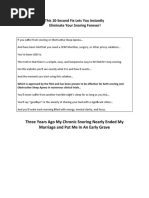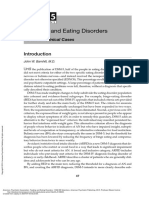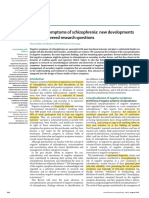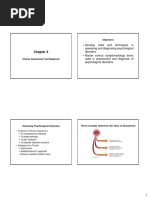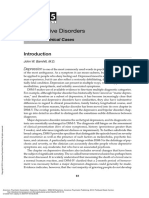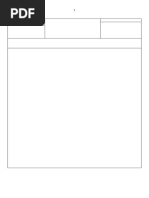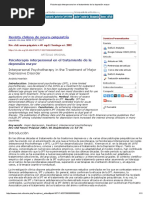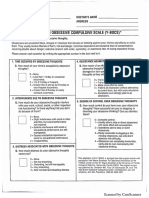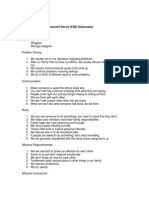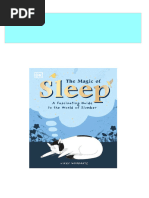0 ratings0% found this document useful (0 votes)
101 viewsBPRS 24 Items
BPRS 24 Items
Uploaded by
Amrat SharmaThis document is the Brief Psychiatric Rating Scale (BPRS) assessment form. It consists of 24 items used to rate symptoms of psychiatric patients based on a clinical interview. Items 1-14 are rated based on patient self-report and items 7, 12, 13 are also rated on observed behavior. Items 15-24 are rated solely based on observed behavior. Additional sections allow the rater to note sources of information, validity concerns, and confidence in the assessment. The full scale is used to comprehensively evaluate and monitor symptoms of patients with psychiatric disorders.
Copyright:
© All Rights Reserved
Available Formats
Download as PDF, TXT or read online from Scribd
BPRS 24 Items
BPRS 24 Items
Uploaded by
Amrat Sharma0 ratings0% found this document useful (0 votes)
101 views1 pageThis document is the Brief Psychiatric Rating Scale (BPRS) assessment form. It consists of 24 items used to rate symptoms of psychiatric patients based on a clinical interview. Items 1-14 are rated based on patient self-report and items 7, 12, 13 are also rated on observed behavior. Items 15-24 are rated solely based on observed behavior. Additional sections allow the rater to note sources of information, validity concerns, and confidence in the assessment. The full scale is used to comprehensively evaluate and monitor symptoms of patients with psychiatric disorders.
Original Title
BPRS 24 items
Copyright
© © All Rights Reserved
Available Formats
PDF, TXT or read online from Scribd
Share this document
Did you find this document useful?
Is this content inappropriate?
This document is the Brief Psychiatric Rating Scale (BPRS) assessment form. It consists of 24 items used to rate symptoms of psychiatric patients based on a clinical interview. Items 1-14 are rated based on patient self-report and items 7, 12, 13 are also rated on observed behavior. Items 15-24 are rated solely based on observed behavior. Additional sections allow the rater to note sources of information, validity concerns, and confidence in the assessment. The full scale is used to comprehensively evaluate and monitor symptoms of patients with psychiatric disorders.
Copyright:
© All Rights Reserved
Available Formats
Download as PDF, TXT or read online from Scribd
Download as pdf or txt
0 ratings0% found this document useful (0 votes)
101 views1 pageBPRS 24 Items
BPRS 24 Items
Uploaded by
Amrat SharmaThis document is the Brief Psychiatric Rating Scale (BPRS) assessment form. It consists of 24 items used to rate symptoms of psychiatric patients based on a clinical interview. Items 1-14 are rated based on patient self-report and items 7, 12, 13 are also rated on observed behavior. Items 15-24 are rated solely based on observed behavior. Additional sections allow the rater to note sources of information, validity concerns, and confidence in the assessment. The full scale is used to comprehensively evaluate and monitor symptoms of patients with psychiatric disorders.
Copyright:
© All Rights Reserved
Available Formats
Download as PDF, TXT or read online from Scribd
Download as pdf or txt
You are on page 1of 1
Brief Psychiatric Rating Scale (BPRS)
(Version 4.0)
Patient Name: Date:
Rate items 1 through 14 on the basis of patient’s self-report during interview. Mark “NA” for symptoms
not assessed. Note items 7, 12, and 13 are also rated on observed behavior during the interview.
Provide examples. NA 1 2 3 4 5 6 7
Not Not Very Mild Moderate Moderately Severe Extremely
Assessed Present Mild Severe Severe
1. Somatic Concern
2. Anxiety
3. Depression
4. Suicidality
5. Guilt
6. Hostility
7. Elevated Mood
8. Grandiosity
9. Suspiciousness
10. Hallucinations
11. Unusual
Thought Content
12. Bizarre Behavior
13. Self-neglect
14. Disorientation
Rate items 15 through 24 on the basis of patient’s observed behavior or speech during the interview.
15. Conceptual
Disorganization
16. Blunted Affect
17. Emotional Withdrawal
18. Motor Retardation
19. Tension
20. Uncooperativeness
21. Excitement
22. Distractibility
23. Motor Hyperactivity
24. Mannerisms and
Posturing
Sources of information (check all applicable): Explain here if validity is questionable:
_____ Patient _____ Symptoms possibly drug induced
_____ Parents/relatives _____ Underreported due to lack of rapport
_____ Mental health professional _____ Underreported due to negative symptoms
_____ Chart _____ Patient uncooperative
_____ Difficult to assess due to formal thought disorder
Confidence in assessment:
_____ Other ______________________________
_____ 1 = not at all — 5 = very confident
Adapted with permission from Manual for Expanded Brief Psychiatric Rating Scale (Expanded Version) developed at the UCLA Clinical
Research Center for Schizophrenia & Psychiatric Rehabilitation, Robert Paul Liberman, MD (Principal Investigator) and published in
Ventura J, Lukoff D, Nuechterlein KH, Liberman RP, Green MF, Shaner A. Training and quality assurance with the Brief Psychiatric
Rating Scale. Int J Methods Psychiatr Res. 1993;3:221-244.
MQ-36110 3000129001
You might also like
- SCID 5 RV Users GuideDocument249 pagesSCID 5 RV Users Guidemeyib92045No ratings yet
- Mini International Neuropsychiatric InterviewDocument3 pagesMini International Neuropsychiatric InterviewElena Florentina Cretu100% (1)
- Family Connections Student Module 1Document8 pagesFamily Connections Student Module 1whatthebaekNo ratings yet
- An Inventory For Measuring Clinical Anxiety: Psychometric PropertiesDocument5 pagesAn Inventory For Measuring Clinical Anxiety: Psychometric Propertiesldfjal jfdçlsakjNo ratings yet
- Inventario Coolidge (CATI)Document69 pagesInventario Coolidge (CATI)Felipe Alejandro Mora VelozNo ratings yet
- LPFS SRDocument6 pagesLPFS SRJohn SteppenwolfNo ratings yet
- Scale TALD ManualDocument31 pagesScale TALD ManualJuliana Grisales100% (1)
- FMXX SpriggsDocument10 pagesFMXX Spriggssuresh22500% (1)
- Snoring SalesDocument33 pagesSnoring SalesmarceloqNo ratings yet
- Hoch Polatin 1949Document29 pagesHoch Polatin 1949mojepatikeNo ratings yet
- SCAAREDAdultVersion 1.19.18 PDFDocument3 pagesSCAAREDAdultVersion 1.19.18 PDFVirvara DanielaNo ratings yet
- Obsessive-Compulsive Disorder in Adults - Epidemiology, Pathogenesis, Clinical Manifestations, Course, and Diagnosis PDFDocument9 pagesObsessive-Compulsive Disorder in Adults - Epidemiology, Pathogenesis, Clinical Manifestations, Course, and Diagnosis PDFdreamingNo ratings yet
- Accurate Expression and Validation 2010Document30 pagesAccurate Expression and Validation 2010Paul ScallanNo ratings yet
- Wender Utah Adhd Rating ScaleDocument1 pageWender Utah Adhd Rating ScaleDaniela Alexandra Ardila ReinaNo ratings yet
- Card Teoria Biosocial Da DBTDocument4 pagesCard Teoria Biosocial Da DBTpsilaisbarbosaNo ratings yet
- Panss Rating CriteriaDocument18 pagesPanss Rating CriteriaIratiNo ratings yet
- Download Complete Trauma and recovery the aftermath of violence from domestic abuse to political terror Judith Lewis Herman PDF for All ChaptersDocument61 pagesDownload Complete Trauma and recovery the aftermath of violence from domestic abuse to political terror Judith Lewis Herman PDF for All Chaptersporssvaphi100% (3)
- 12521760085Document3 pages12521760085Bob StanevNo ratings yet
- ADHD Diagnosis and Treatment Guidelines: A Historical PerspectiveDocument11 pagesADHD Diagnosis and Treatment Guidelines: A Historical PerspectiveCristinaNo ratings yet
- The Health Anxiety Inventory - Development and Validation of Scales For The Measurement of Health Anxiety and Hypochondriasis 2002Document11 pagesThe Health Anxiety Inventory - Development and Validation of Scales For The Measurement of Health Anxiety and Hypochondriasis 2002Catalina NedelciuNo ratings yet
- Levenson Self-Report Psychopathy ScaleDocument1 pageLevenson Self-Report Psychopathy Scalesoumya09No ratings yet
- Daily Mood Chart For Mood Tracking MsDocument3 pagesDaily Mood Chart For Mood Tracking MsechopennerNo ratings yet
- DSM 5 Clinical Cases - Feeding and Eating DisordersDocument14 pagesDSM 5 Clinical Cases - Feeding and Eating DisordersAlexandra MurdyNo ratings yet
- Brand Loewenstein Spiegel Dispelling Myths DIDTreatment 2014Document23 pagesBrand Loewenstein Spiegel Dispelling Myths DIDTreatment 2014Inna RiegoNo ratings yet
- Patient Health Questionnaire (Phq-9) : Date: NameDocument2 pagesPatient Health Questionnaire (Phq-9) : Date: NameRubie Ann TillorNo ratings yet
- Dependent Personality Inventory-Revised (DPI-R) - Incorporating ADocument85 pagesDependent Personality Inventory-Revised (DPI-R) - Incorporating AMELISA ZELEDONNo ratings yet
- NSW Department of Health 2004 Suicide Risk Assessment and Management Protocols General Community Health ServiceDocument20 pagesNSW Department of Health 2004 Suicide Risk Assessment and Management Protocols General Community Health ServiceLuna MArinaNo ratings yet
- The Clinical Assessment Interview For Negative SymDocument9 pagesThe Clinical Assessment Interview For Negative SymJohanes DavidNo ratings yet
- Negative Symptoms EQZ Lancet ReviewDocument14 pagesNegative Symptoms EQZ Lancet ReviewConstanza González GutiérrezNo ratings yet
- Assessment, Before, Interpersonal Iip-48Document3 pagesAssessment, Before, Interpersonal Iip-48sunkissedchiffonNo ratings yet
- Csep-II Experiential Therapy Session FormDocument16 pagesCsep-II Experiential Therapy Session FormSicologo Felipe PuertaNo ratings yet
- Module 2.1Document7 pagesModule 2.1Ken SantosNo ratings yet
- Neuropsychological FinalDocument45 pagesNeuropsychological FinalFe Niña FranciscoNo ratings yet
- Clock Drawing TestDocument5 pagesClock Drawing TestrumaishaNo ratings yet
- SCID 5 CV - ScoreSheetDocument28 pagesSCID 5 CV - ScoreSheetZubair Mahmood Kamal100% (1)
- DSM 5 Clinical Cases - Depressive DisordersDocument32 pagesDSM 5 Clinical Cases - Depressive DisordersAlexandra MurdyNo ratings yet
- PANNS Answers Sheet For For ResultsDocument4 pagesPANNS Answers Sheet For For Resultsaqsa shahidNo ratings yet
- Cognitive Function in Schizophrenia A Review 187 PDFDocument8 pagesCognitive Function in Schizophrenia A Review 187 PDFEvaNo ratings yet
- Clinical Global ImpressionDocument1 pageClinical Global ImpressionTamara GerbertNo ratings yet
- Differentiating Anxiety and Depression: A Test of The Cognitive Content-Specificity HypothesisDocument5 pagesDifferentiating Anxiety and Depression: A Test of The Cognitive Content-Specificity HypothesismiraNo ratings yet
- Anxiety Disorders Interview Schedule For dsm-5Document4 pagesAnxiety Disorders Interview Schedule For dsm-5Antonio ChirinoNo ratings yet
- Psicoterapia Interpersonal en El Tratamiento de La Depresión MayorDocument11 pagesPsicoterapia Interpersonal en El Tratamiento de La Depresión MayorAndrea MiñoNo ratings yet
- Horowitz Event ScalesDocument10 pagesHorowitz Event Scalesvota167No ratings yet
- Treatments RecommendationDocument2 pagesTreatments RecommendationRIFHAN KHAIRANI BINTI RUDIJANTO EKO NUGROHO -No ratings yet
- Post Traumatic Stress Disorder 1Document8 pagesPost Traumatic Stress Disorder 1Shubhranshul DwivediNo ratings yet
- Ocd ReviewDocument4 pagesOcd ReviewneriNo ratings yet
- 8044 31387 2 PBDocument18 pages8044 31387 2 PBDany AdexNo ratings yet
- Guia para El TDAHDocument23 pagesGuia para El TDAHEstebanGiraNo ratings yet
- Assessment-Guided Neurofeedback For Autistic SpectDocument50 pagesAssessment-Guided Neurofeedback For Autistic Spectminami.heartful.dayNo ratings yet
- UnisaDocument7 pagesUnisaAnonymous koX40Ei100% (6)
- Keefe. The Schizophrenia Cognition Rating ScaleDocument7 pagesKeefe. The Schizophrenia Cognition Rating ScaleRosarioBengocheaSeco0% (1)
- Gloster, A.T. - The Empirical Status of ACT. A Review of Meta-Analyses PDFDocument58 pagesGloster, A.T. - The Empirical Status of ACT. A Review of Meta-Analyses PDFAlvaro Paredes RiveraNo ratings yet
- The Clinical Interview and AssessmentDocument6 pagesThe Clinical Interview and AssessmentIoana Antonesi100% (2)
- Mentalization-Based Treatment For Self-Harm in Adolescents - A Randomized Controlled TrialDocument13 pagesMentalization-Based Treatment For Self-Harm in Adolescents - A Randomized Controlled TrialManya DhuparNo ratings yet
- Yale-Brown Obsessive Compulsive Scale (Y-BOCS)Document3 pagesYale-Brown Obsessive Compulsive Scale (Y-BOCS)dmhp paschim medinipurNo ratings yet
- Full Download Treatment of Borderline Personality Disorder 2nd ed A Guide to Evidence Based Practice 2nd Edition Joel Paris PDF DOCXDocument67 pagesFull Download Treatment of Borderline Personality Disorder 2nd ed A Guide to Evidence Based Practice 2nd Edition Joel Paris PDF DOCXguiotmouskiNo ratings yet
- APA+Spring Catalog 2020Document52 pagesAPA+Spring Catalog 2020АлексNo ratings yet
- Pops Test ResultsDocument3 pagesPops Test ResultsDana MobayedNo ratings yet
- The Montreal Cognitive Assessment, Moca: A Brief Screening Tool For Mild Cognitive ImpairmentDocument5 pagesThe Montreal Cognitive Assessment, Moca: A Brief Screening Tool For Mild Cognitive ImpairmentSarah Nova GradiskaNo ratings yet
- Cognitive Deficits in Schizophrenia: An Evidence Based ApproachDocument37 pagesCognitive Deficits in Schizophrenia: An Evidence Based ApproachDr UmeeNo ratings yet
- McMaster FAD SubscalesDocument2 pagesMcMaster FAD SubscalesOtilia Ema100% (1)
- Depression Conceptualization and Treatment: Dialogues from Psychodynamic and Cognitive Behavioral PerspectivesFrom EverandDepression Conceptualization and Treatment: Dialogues from Psychodynamic and Cognitive Behavioral PerspectivesChristos CharisNo ratings yet
- First-Generation Antipsychotic Medications - Pharmacology, Administration, and Comparative Side Effects - UpToDateDocument18 pagesFirst-Generation Antipsychotic Medications - Pharmacology, Administration, and Comparative Side Effects - UpToDateAdolfo SánchezNo ratings yet
- Importance of SleepDocument10 pagesImportance of SleepKopano'Gucci'ModisenyaneNo ratings yet
- Methylphenidate Use in Geriatric Depression A Systematic ReviewDocument9 pagesMethylphenidate Use in Geriatric Depression A Systematic Review정수봉No ratings yet
- Ass. in PhiloDocument3 pagesAss. in PhiloKael AsonyabNo ratings yet
- NSTP, Drug AwarenessDocument5 pagesNSTP, Drug AwarenessDaennise Louiseanna SebastianNo ratings yet
- Toolbox February 2024 Fighting FatigueDocument3 pagesToolbox February 2024 Fighting FatigueDamilare Idowu-TaiwoNo ratings yet
- Generalised Anxiety Disorder ThesisDocument5 pagesGeneralised Anxiety Disorder Thesisalyssahaseanchorage100% (2)
- Dokumen - Pub - Emotionally Focused Therapy For Couples 0898627303 0898621534Document250 pagesDokumen - Pub - Emotionally Focused Therapy For Couples 0898627303 0898621534Fernanda RuteNo ratings yet
- 3 Month Old Sleep Schedule Bedtime and Nap Schedule HuckleberryDocument1 page3 Month Old Sleep Schedule Bedtime and Nap Schedule HuckleberryMadalina IsacNo ratings yet
- The Magic of Sleep A Fascinating Guide To The World of Slumber Vicky Woodgate Ebook All Chapters PDFDocument52 pagesThe Magic of Sleep A Fascinating Guide To The World of Slumber Vicky Woodgate Ebook All Chapters PDFvalkebaci100% (6)
- Dissociative DisordersDocument6 pagesDissociative Disordersramkumar kirubaharanNo ratings yet
- This Content Downloaded From 94.204.181.74 On Wed, 29 Sep 2021 09:42:28 UTCDocument12 pagesThis Content Downloaded From 94.204.181.74 On Wed, 29 Sep 2021 09:42:28 UTCsimineanuanyNo ratings yet
- BPRS 24 ItemsDocument1 pageBPRS 24 ItemsAmrat SharmaNo ratings yet
- Emotional Intelligence - Atkinsons, Oliver J. & Patterson, SusanDocument999 pagesEmotional Intelligence - Atkinsons, Oliver J. & Patterson, Susanclaudia.banc2023No ratings yet
- Role of Sports in Managing StressDocument33 pagesRole of Sports in Managing StressReyanne Dela CruzNo ratings yet
- 12. LUYỆN VIẾT ĐOẠN VĂN TIẾNG ANH - ON DRUG ADDICTIONDocument4 pages12. LUYỆN VIẾT ĐOẠN VĂN TIẾNG ANH - ON DRUG ADDICTIONVũ TuấnNo ratings yet
- Opioid Tapering Flow Sheet: Start HereDocument2 pagesOpioid Tapering Flow Sheet: Start HeregegeNo ratings yet
- Complete Download The Oxford Handbook of Sleep and Sleep Disorders Charles M. Morin PDF All ChaptersDocument82 pagesComplete Download The Oxford Handbook of Sleep and Sleep Disorders Charles M. Morin PDF All Chaptersrshajc100% (4)
- ... BATCHO - Nostalgia - Retreat or Support in Difficult TimesDocument14 pages... BATCHO - Nostalgia - Retreat or Support in Difficult TimesKatarína MlichováNo ratings yet
- Case ProfileDocument4 pagesCase Profileharsh7hoodaNo ratings yet
- Pain Management Sertraline Fact SheetDocument3 pagesPain Management Sertraline Fact SheetReem AbuziedNo ratings yet
- Physiology of Sleep and ConsciousnessDocument40 pagesPhysiology of Sleep and ConsciousnessZobayer AhmedNo ratings yet
- Annotated BibliographyDocument6 pagesAnnotated BibliographyNaomi BerkovitsNo ratings yet
- INI CET Psychy 2022-2020 Solved PDF AtfDocument78 pagesINI CET Psychy 2022-2020 Solved PDF Atfsimrankaur2003studNo ratings yet
- Alagang UnilabDocument2 pagesAlagang UnilabtheaNo ratings yet
- 4.1 Recognizing EmotionsDocument4 pages4.1 Recognizing Emotionsionut307No ratings yet
- Jurnal Psikiatri 03Document20 pagesJurnal Psikiatri 03Ike DekockNo ratings yet
- Trip TicoDocument2 pagesTrip TicomiguelNo ratings yet








